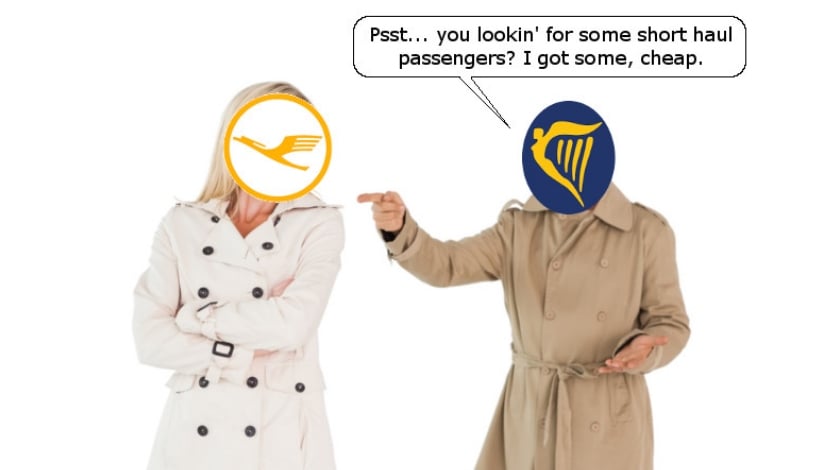This week, the Financial Times looked at the purportedly novel idea that Ryanair and easyJet may try to cooperate with legacy carriers to transfer passengers.
This would be news for those two airlines, but it’s not a surprise. While it’s certainly not something without precedent, this plan is a little different. It’s going to be much harder to make this work.
easyJet and Ryanair are interested in bringing people to gateway cities
The article talks about how both easyJet and Ryanair are interested in bringing people to gateway cities and then transferring them to traditional long haul carriers. In other words, they’re looking for an interline agreement, but with a twist (which we’ll get into later). That these airlines are exploring this possibility is not surprising at all considering where they are in their histories.
When new airlines start, most fail in a short period of time. But when an airline finds a niche that works, it looks to grow quickly. Not only does growth help to keep unit costs lower (constantly adding new, entry level wages) but it also helps to compete with other airlines that might try to serve the same niche. During this phase of life, the goal is to just keep growing and keep costs low. It’s a beautiful thing.
Eventually, however, airlines start looking for other avenues to keep growth rates up. They start to realize that having the lowest costs won’t necessarily matter if they can increase revenue more than they increase costs. While low cost carriers traditionally don’t like the idea of partnering with other airlines because of the costs involved, the older they get, the more benefit they see.
In the US, take a look at JetBlue in New York and Boston. Look at Virgin America in San Francisco and LA. And though it’s a slightly different model, look at Alaska in Seattle and Hawaiian in Honolulu. All of these airlines share something unique. They have strong positions in major international gateways, and they can provide feed to a variety of airlines without adding too much cost. The revenue benefit is well worth it.
The situation with Ryanair and easyJet is somewhat different. Yes, they’re ultra low cost carriers but that’s not what’s different. They’re ultra low cost carriers that have been around a lot longer than their counterparts in the US so they’re further along in their life cycle.
What’s different is that JetBlue and Virgin America focus their partnering efforts on carriers abroad. Those foreign carriers can’t fly domestically within the US, so it makes sense for them to tap into the networks of US-based airlines.
What easyJet and Ryanair are talking about is partnering with airlines in their own backyard. So instead of feeding American or United for their flights across the Pond, Ryanair and easyJet want to put people on Lufthansa, British Airways, etc.
If this sounds crazy, it probably is for several reasons:
- These airlines would have a hard time feeding each other considering their networks don’t overlap all that much. BA’s hub is Heathrow, yet there are no low cost carriers at Heathrow. Frankfurt? You won’t see Ryanair or easyJet there. Paris/Charles de Gaulle? easyJet does fly there but Ryanair doesn’t. This isn’t necessarily for lack of trying. If low cost carriers could get slots at Heathrow, they’d be there. And that could be part of the reason these airlines want to work with legacy carriers. It might help crack open the door.
- Labor would lose their minds. When JetBlue feeds an Aer Lingus flight, it’s not pushing away passengers it would carry on its own (or vice versa). But if Ryanair puts people on British Airways, those could very well be people that BA could carry itself. Should BA be carrying those passengers? We can debate that, but I can guarantee where labor would land on that topic.
- While the idea of interlining is great, it sounds like Ryanair wants to take absolutely no responsibility or bear any costs. (That’s the “twist” I was talking about.) According to the FT article, Ryanair refuses to have to deal with what happens if it delivers a passenger late and that person misses a connection. The way Ryanair sees it would be almost like an old regional airline prorate deal.
The idea, of course, is that legacy carriers could reduce their short haul operations and farm it out to more efficient airlines. But labor would go scorched earth if that were to happen. You’ve seen them go nuts for much less, just look at every other week at Lufthansa and Air France.
Arrangement seems sweet for Ryanair
You wouldn’t buy a Ryanair ticket at all. You’d buy a ticket on the big long haul airline and it would just include a flight on Ryanair with it. But if anything goes wrong that long haul airline would have to deal with it.
That arrangement seems sweet for Ryanair. The airline gets more passengers and has nothing else to worry about. But were I Air France, I don’t think I’d be too thrilled.
I tend to think the best way to structure this is how GatwickConnects has done it. That’s a fantastic way to let the airport create the business of connecting airlines that don’t work together. More airports should take that lead.

